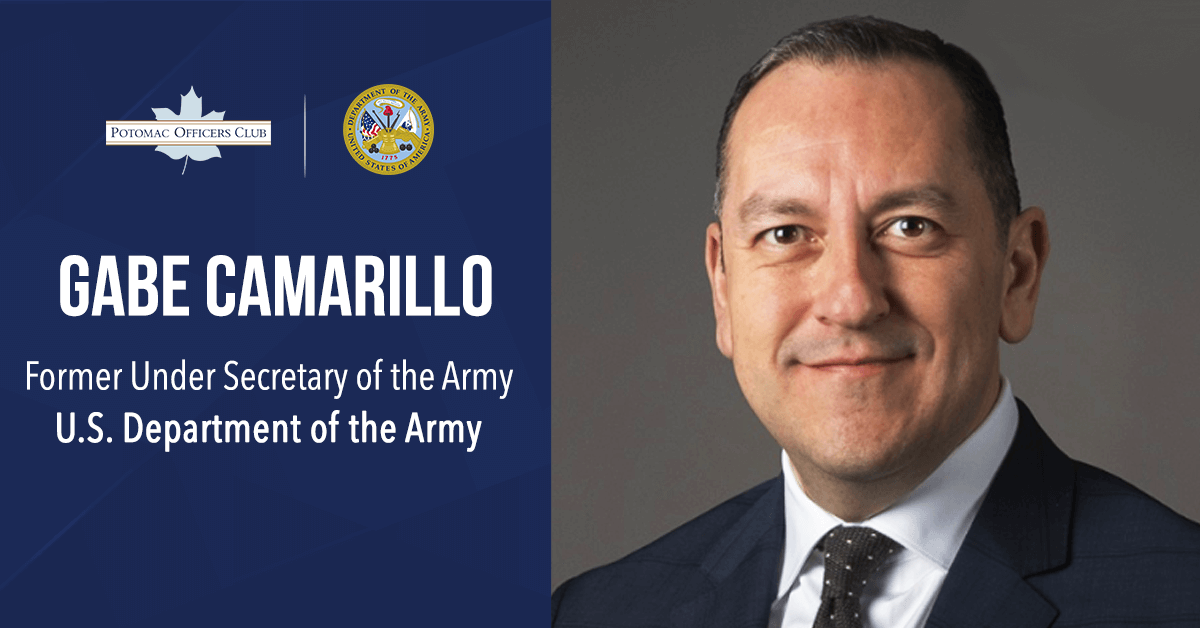
Manning addresses an audience of government contractors. Photo: Charles McClanahan
DOD’s Ashley Manning Unveils 4 Priorities for Pentagon Cyber Operations
The assistant secretary of defense for cyber policy role was created a year ago to manage the strategy and operations of the Pentagon’s cyberspace activities in a civilian-facing manner. Ashley Manning, an experienced defense and international relations official, performed the duties of this role for its first several months and effectively got the program going. She’s now principal deputy assistant secretary for cyber policy at DOD (second-in-command) and says the office is fully committed to executing President Trump and Secretary of Defense Pete Hegseth’s vision. (The latter is notably a winner of the 2025 Wash100 Award.)
“Achieve peace through strength” is the main message from Trump that the ASD for cyber policy wing has received, Manning told a crowd of government contractors at the Potomac Officers Club’s 2025 Cyber Summit last week.
“Consistent with the president’s direction, Secretary Hegseth has also laid out his priorities, and these include restoring warrior ethos, rebuilding our military and reestablishing deterrence. We are operationalizing each of these priorities in the cyber domain,” Manning stated.
No DOD component has thus far been as impacted by Trump and Hegseth’s directives as the U.S. Army. At the top of the month, Hegseth issued a new realignment and strategy memo that calls for restructuring and modernization at the service branch. Partner with top officials and listen as they point the way forward at the 2025 Army Summit on June 18. Register now for the industry’s top GovCon conference for Army collaborators.
Manning’s Clarifications on Trump & Hegseth’s Directives
Manning said that Trump’s “achieve peace through strength” mantra is not about seeking conflict but rather, preventing it. This is being accomplished by her office through a focus on developing both offensive and defensive cyber capabilities and investing in advanced persistent threat detection capabilities.
“We are not simply just reacting to threats. We are proactively developing innovative operational concepts and deploying cutting edge capabilities to deter oppression and maintain our advantage. Our commitment to cyber dominance is also not just about today’s threats, but about tomorrow’s as well,” Manning said.
For DOD cyber operations, Hegseth’s “restoring a warrior ethos” involves “fostering a culture of excellence, discipline upon unwavering commitment among our cyber warriors, who are truly the digital guardians of our nation. Rebuilding our military and cyberspace requires a sustainable investment in cutting-edge technologies and innovative operational concepts. And reestablishing deterrence in cyberspace requires both the capability and the will to respond decisively to malicious cyber activity,” the official explained.
4 Cyber Priorities for DOD
In defending against “transnational criminal organizations” and concentrated national cyber aggressors like China, Manning decreed three main priorities for her component going forward.
Increasing Lethality
Boosting lethality means strengthening the arsenal of cyber protections both in peacetime and conflict. This must be done, Manning instructed, in collaboration with other federal agencies and international allies, and cyber tools must be fused with strategies in other domains. When in isolation, cyber tactics don’t have the same impact as they do when linked to an array of force.
Enhancing Resilience
A resilience focus for Manning begins with basic cybersecurity best practice enforcement. This means, of course, ensuring technologies and processes meet zero trust architecture expectations, as well as migrating “systems and data to secure cloud environments.” Software must be secure, critical infrastructure should be prioritized and the software acquisition pathway, a favorite of Hegseth’s, will be utilized in the future, Manning said.
Innovation
The DOD is committed to fostering innovation in its technological approach and AI is a huge piece of that, according to Manning.
“We work really closely with the CIO, the [Chief Digital and Artificial Intelligence] office, the Defense Innovation Unit and other parts of the Defense Department take a multi-pronged approach to AI. This includes ensuring that AI systems which have unique security needs are protected from cyber threats. We are building the security and resilience into every step of the AI system’s lifecycle. AI also has the potential to improve the cybersecurity resilience of systems,” she said.
Potomac Officers Club’s 2025 Army Summit will continue the conversation on AI with a panel discussion entitled “Hyperconnected Warfare: Next-gen Orchestration of Humans, Machines, Transport, and AI on the Battlefield.” Sign up for this high-stakes GovCon event today!
Workforce
Manning said she is particularly passionate about this final priority area.
“All of our strategic efforts, all of our technological enhancements and all of our faults and decisions ultimately converge on one fundamental point: the importance of our nation’s warfighters. They are the backbone defense here, they are the shield that protects our freedoms, they are the embodiment of our nation’s bodies. Nowhere is this truer than in the cyber domain, where heavy-skilled and dedicated professionals are essential to defending our nation. Against increasingly sophisticated threats, it’s of vital importance that we have the best talent in the world,” Manning said.

Category: Articles





